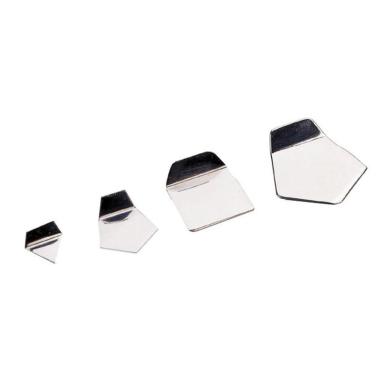Offering the best quotes for your research!
New and used scientific instruments
🚚 Shipping Worldwide 🌎
✉️ info@questpair.com
Radwag M1 Mass Standard - Flat Polygonal Sheet - 10 mg
Product Description
Class M1 mass standards are versatile measuring tools characterized by their high precision and versatility in laboratory, industrial or commercial applications. Classified as M1 metrology class, they are valued for their versatility and accuracy in mass measurement.
M1 mass standard: flat polygonal sheet
Nominal value: 10 mg
Material: nickel silver
M1 Class Mass Standards – Key Features
High-Level Precision - M1 class mass standards are designed to ensure precision in mass measurements. Permissible deviations from the actual mass are set with strict standards.
Versatility of Applications - Characterized by versatility, M1-class standards are used in fields such as laboratories, industry, commerce and other areas requiring precise weight measurements.
Measurement Stability - M1-class mass standards are stable over time, meaning that they maintain their measurement precision even despite prolonged use. This feature is especially important for tools that are used regularly.
Operation in a Wariety of Ambient Conditions - M1 class mass standards are designed to cope with both laboratory, industrial and commercial conditions.
Application
- Analytical Laboratories
In analytical laboratories where precise measurements are crucial, Class M1 mass standards are used to calibrate medium-precision balances.
- Manufacturing Industry
In the manufacturing industry, where product quality control is important, M1 class mass standards can be used to calibrate balances used in the manufacturing process.
- Weighing Trade
In the weighing trade, where measurement precision is required by law, M1 class mass standards can be used as a reference for calibrating commercial balances.
- Testing Laboratories
In research laboratories, Class M1 mass standards can be used to ensure precise weight measurements.
Class M1 mass standards are versatile tools that are used in various areas of life. Their ability to adapt to different conditions makes this class of standards highly valued in the world of science, industry and commerce alike.
Item Stats
About QuestPair
Our Mission
QuestPair is Europe's leading platform for scientific equipment, connecting researchers and organizations with verified suppliers of both new and pre-owned laboratory instruments in the biotech and material science industry. Our aim is to make the procurement of scientific instruments more efficient, cost-effective, and reliable, so that laboratories can focus on advancing science rather than searching equipment and negotiating deals.
Why Choose Us
Founded by scientists for scientists, we understand your challenges. Our AI-powered platform offers transparent pricing, verified quality, and expert support, ensuring you find the perfect equipment for your research needs.
Verified Quality
Every piece of equipment undergoes thorough verification by our expert team, ensuring reliability and performance.
Cost Efficiency
Access both new and premium pre-owned equipment, saving up to 40% without compromising on quality.
Expert Support
Our dedicated team provides personalized guidance throughout your equipment procurement journey.
Ready to Transform Your Research?
Join thousands of biotech scientists who trust QuestPair for their equipment needs.
What customers think about QuestPair
Brilliant service. Everything arrived and was exactly as expected
Jon Welburn
Great customer service! Got me great options for the equipment I was looking for and in a timely manner.
Pamela
Space Lab Technologies, LLCHarm is very responsive to help me find the right equipment. The product I received is in a good condition.
Ph.D. Hsin-Wen Liang
Northeastern UniversityFrom €10.00ex. VAT
In Stock
Get a quote within one business day
Verified equipment
Trusted warranties & returns
Safe payment and fast delivery
Didn't find what you're looking for?
Our sales team specializes in sourcing custom and hard-to-find products to meet your exact specifications. Submit a request for a tailored quote.
Frequently Asked Questions
Is this equipment new or refurbished?
How long does shipping take?
What about warranty and returns?
Why request a quote?
Need help choosing the right tool?
- Accurate policy information specific to your chosen product
- Clear understanding of warranty coverage and terms
- Detailed return policy explanation
- Transparent shipping options and costs
Customer Service
Here to help you with: Product Inquiries, Shipping & Support, Technical Support, Business Inquiries and Press.
We are available to assist you Mon-Fri, 10am - 5pm CET.
